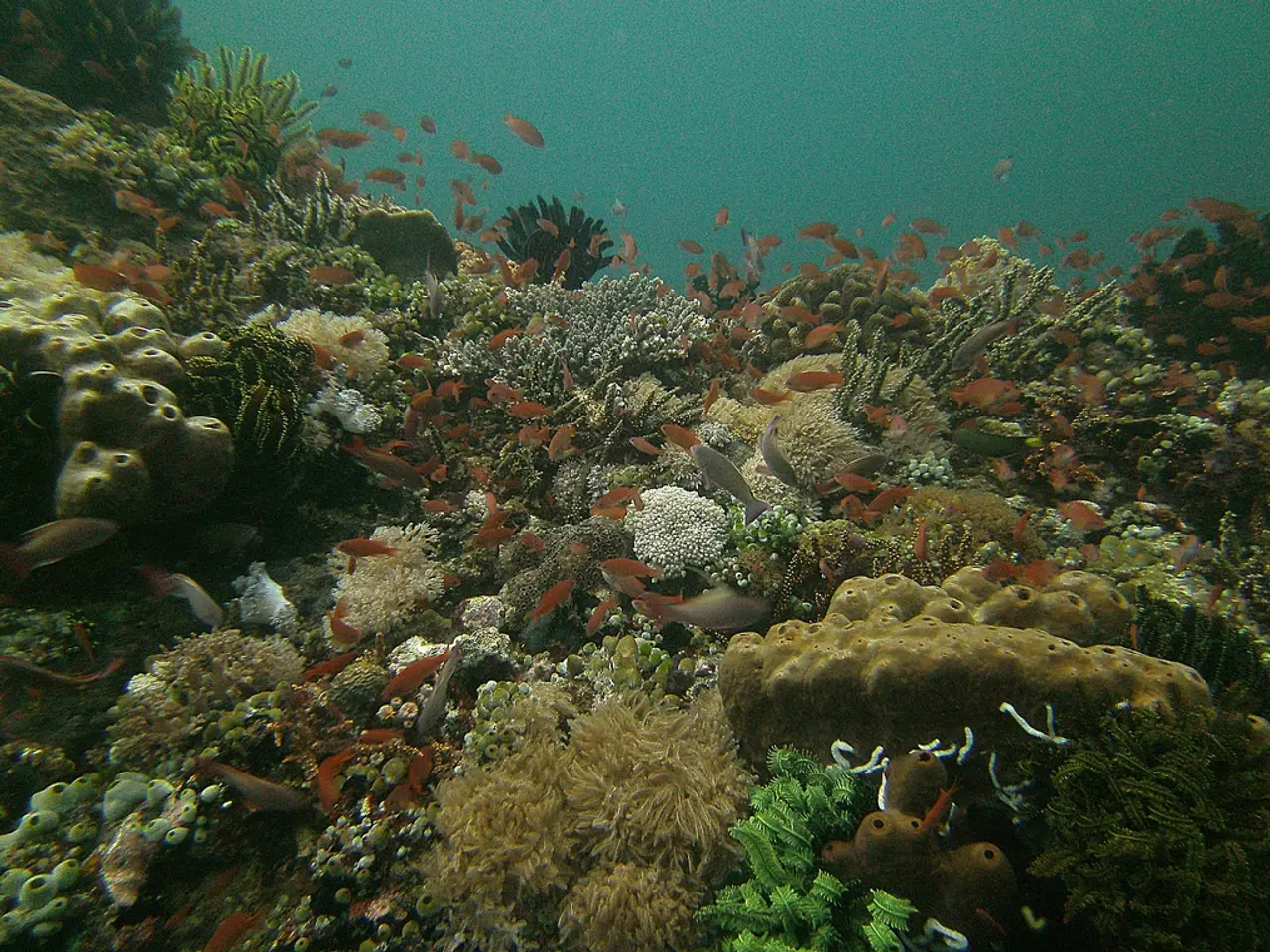Discover the secrets of listening deeply to the ocean's phononic waves, and learn how this practice benefits marine life preservation - "The Deep Ocean Sonic: Unraveling the Power of Deep Listening in Ocean Conservation"
The Mesoamerican Reef, stretching from Mexico through Belize, Guatemala, and Honduras, is the second-largest barrier reef system in the world. This vibrant ecosystem, often referred to as a "world of sound", is home to a rich acoustic environment, with sounds ranging from coral crackling to fish vocalizations, snapping shrimp, and even anthropogenic noises like boats.
The Ocean World of Sound (WOS) initiative, based in Cancún, Mexico, is a global, transdisciplinary movement that harnesses the transformational power of underwater soundscapes. WOS believes in inspiring empathy and curiosity through the unique data source that sound provides for understanding the Mesoamerican Reef ecosystem.
Passive Acoustic Monitoring (PAM) is a key tool used by WOS to record and analyse these underwater sounds. By capturing the diverse soundscape signatures of coral reefs, PAM serves as an indicator of ecosystem condition, species presence, and behaviour. These acoustic data support marine conservation by providing real-time, non-invasive insights into the reef's biological activity and potential disturbances.
Heather Spence, a marine biology student, was inspired to address the management of marine resources and anthropogenic impacts on coral reefs during a holiday in Cancún. This inspiration led to the launch of the first-ever PAM program in the Mesoamerican Reef, Ears in the Caribbean, in collaboration with Dr. Jaime González Cano.
WOS's initiatives fuse science, art, and community, inviting various groups to engage in "active listening" through interactive workshops, educational challenges, art installations, and citizen science projects. The organisation has organised 31 events since 2021, reaching over 1,700 people and totaling 152 hours.
In addition to its work in the Mesoamerican Reef, WOS has initiated a pilot project assessing coral restoration efforts using Passive Acoustic Monitoring in the Maldives. The organisation is also collaborating with the University of Cádiz (INMAR) on a citizen science project using sound data to train machine learning models to detect marine mammal whistles.
The Ocean World of Sound: MesoAmerican Reef is an endorsed action addressing three Ocean Decade Challenges: developing a sustainable, resilient and equitable ocean economy, sustainably expanding the Global Ocean Observing System, and skills, knowledge, technology and participation for all. WOS encourages staying updated on their science, workshops, and citizen science opportunities by visiting their website.
By promoting community-driven conservation, working with local Marine Protected Areas, schools, artists, and cultural leaders, WOS emphasises the importance of bridging the gap between science and the community. Through its innovative use of Passive Acoustic Monitoring, WOS is making significant strides in conserving the Mesoamerican Reef and inspiring a new generation of ocean advocates.
- Heather Spence, inspired by the unique sounds of the Mesoamerican Reef during a holiday, launched the first-ever Passive Acoustic Monitoring (PAM) program, Ears in the Caribbean, as part of her marine biology studies.
- WOS, a global initiative based in Cancún, Mexico, encourages lifelong learning by fusing science, art, and community through interactive workshops, educational challenges, art installations, and citizen science projects.
- In addition to its work in the Mesoamerican Reef, the Ocean World of Sound (WOS) is also collaborating with the University of Cádiz (INMAR) to use sound data from various marine environments to train machine learning models to detect marine mammal whistles, contributing to the sustainably expanding the Global Ocean Observing System.
- By bridging the gap between science and the community, and working with local Marine Protected Areas, schools, artists, and cultural leaders, WOS is promoting sustainable living and lifelong learning, making significant strides in conserving the Mesoamerican Reef and inspiring a new generation of ocean advocates.




